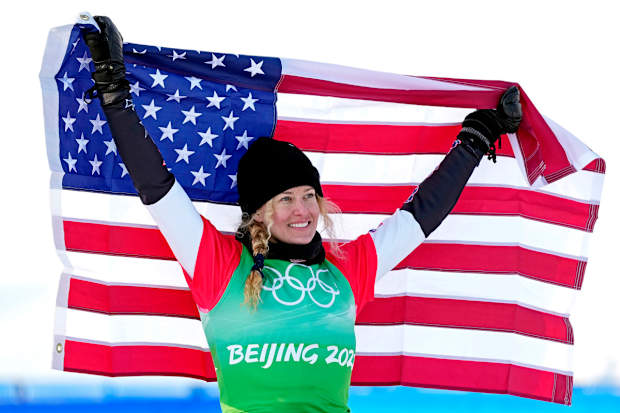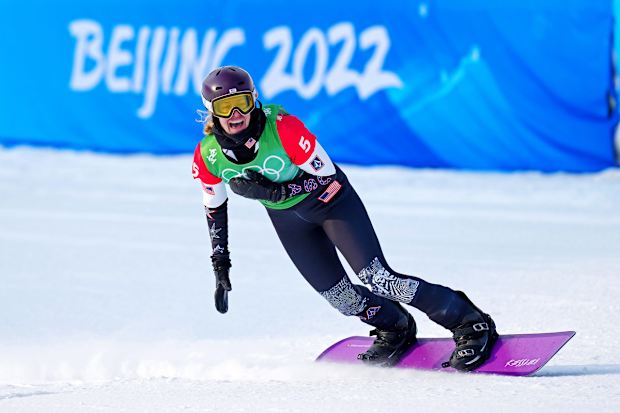BEIJING — Sports fans sometimes talk about an athlete “deserving” more attention, and the word always feels a bit off. These are people who are good at sports, and it’s fun to watch them and talk about them. But nobody really deserves attention for that.
This story is the exception.
Lindsey Jacobellis deserves NBC prime-time coverage, big-font headlines, social media posts and to be the subject of whatever the COVID-19-era version of watercooler conversation is. That’s the kind of treatment she got 16 years ago, when she made one of the most infamous mistakes in Olympic history. It is what she absolutely deserves today.
Jacobellis just won gold in snowboard cross—beating three other finalists, half a lifetime’s worth of demons and the nagging sense that she would forever be remembered for not winning. In 2006, in Turin, she was on the verge of winning gold, when she grabbed her snowboard to celebrate before the finish, stumbled and ended up with silver. She said afterward that she was just trying to have fun and put on a show, a sentiment that offended the U.S. sports media and made her a topic of national debate. That mistake followed her for the rest of her career. It’s hard enough to win an Olympic event—any Olympic event. Try doing it when the world won’t let you escape your own shadow.
“I definitely have put 2006, obviously, in the past,” Jacobellis said Wednesday, “and have done a lot of soul-searching to realize that that moment doesn’t define me.”

Most Olympians live strange public lives. They compete in relative anonymity except for a two-week window every four years when the U.S. pays attention. In 2006, Jacobellis was branded as something worse than a loser. She was portrayed as indifferent to competition, the pretty young face of a bunch of goofy sports that didn’t belong in the Olympics. We all make mistakes; hers offended some people. Then Jacobellis was sent back to live with it on her own, except for every four years, when she showed up at the Olympics hoping to write a new story while everybody kept reminding her of her old one.
In 2010 she failed to make the final. In ’14 she missed the final again, then said, “They’ll spin it every negative way until the cows come home.” She competed in the small final, the consolation run with no medal at stake, and she gave her best and won it. It confirmed that of course she cared. But most of America did not.
In 2018 in Korea, a reporter started to ask her about what had happened in ’06, and she misunderstood the question, and said with annoyance: “Did you say, ‘What happened?’ You can look that up.” She had persevered through three knee surgeries. She said she was on an “ibuprofen diet.” She finished fourth, 0.03 seconds from a bronze. But people still looked at her and saw the 20-year-old with pigtails.
It was both totally unfair and totally understandable. I was at that 2006 race. I remember watching her grab the snowboard. I remember who was standing next to me. In roughly two seconds, it went from a quirky little event I didn’t really understand to one of those rare sports moments that I knew I would remember for decades.
Jacobellis went from a kid having fun to a cultural character she had no interest in playing. Four years ago, she said, “I did not love the sport when I was that young going into it. I was told that I was America’s sweetheart, that you’re going to win. … That’s just a lot of pressure to put on somebody and go on a world stage. It’s enough to really throw somebody for a loop.”
She arrived in Beijing at age 36, after years of psychological renovation, knowing she could never be America’s sweetheart again.
“It’s just because I was very young and extremely marketable,” she said of her 2006 stardom and endorsements. “As women get older, they might lose the shine.”

Danielle Parhizkaran/USA TODAY Sports
The last 16 years have shown her what is real and what is not. The love that America almost had for her in 2006 was not real; the love she has for the sport now is. A lot of the outrage back then wasn’t real, either. It was the function of a news cycle that runs on loud opinions. Critics got mad in the moment and then moved on, as critics do.
Her silver medal in 2006 was real. Her disappointment in the next three Olympics was real. The feelings she had before the final here were real, too. She was fatigued and proud and living firmly in ’22.
“I was almost relieved,” she said. “I had this energy I got from it, and this weight lifted off of me—that I was happy with whatever result I got because I made it into finals.”
The race was blissfully uneventful. Jacobellis darted out in front in the beginning, and in an event that often includes numerous lead changes, she stayed there. And toward the end, with France’s Chloé Trespeuch chasing her, at the same point in the race where Jacobellis grabbed her board in 2006, her thoughts were not about celebrating early or signing endorsement deals or pleasing a crowd or changing the world’s view of her. “I just wanted to fly that last jump low, track my board straight, because I could hear Chloé behind me.”
Sixteen years ago, Jacobellis sparked a debate about what an Olympian should be. Wednesday, she showed us.







